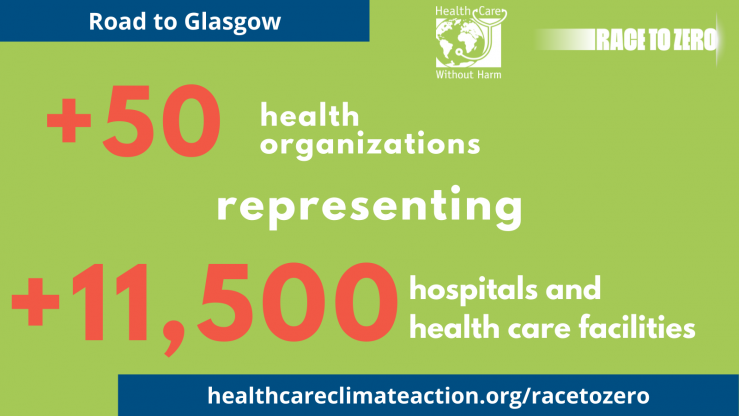Momentum for health care climate action builds with over 50 health care systems representing more than 11,500 hospitals and health centers from 21 countries committing to achieve net zero emissions before 2050.
Health Care Without Harm, the official Race to Zero health care partner, today announced that over 50 health care institutions, collectively representing more than 11,500 health care facilities in 21 countries, are part of the UN-backed Race to Zero campaign. In joining the Race to Zero, these organizations commit to achieving net zero emissions by 2050. They become part of the largest ever alliance outside of national governments committed to delivering a zero carbon world in line with the Paris Agreement. Organizations are joining Race to Zero via the Health Care Climate Challenge.
The health care organizations in Race to Zero include institutions ranging from individual public and private hospitals and health systems to entire provincial or state government health departments. In recent weeks several large health systems have signed on to this vital commitment. These systems include the Kerala Directorate of Health Services in India, the international private health care and insurance system, Bupa, and CommonSpirit Health in the United States. They demonstrate global leadership in the health care sector by committing to net zero emissions and taking immediate climate action.
“It’s exciting to see the momentum of health care organizations worldwide join the Race to Zero. All health organizations, large and small, can accelerate the transition to a healthier, sustainable, and more equitable world,” said Gonzalo Muñoz, UN High Level Climate Champion.
“At a time when Kerala is facing unprecedented climate events, the State Health Department has shown its commitment to climate resilience and pledged to achieve net zero healthcare by signing up to the Race to Zero program. This initiative brings health facilities of the state on track to being low carbon and climate resilient,” said Smt. Veena George, Honorable Minister of Health and Family Welfare Government of Kerala.

“As a global healthcare company, we are very conscious that people’s health depends on a healthy planet and we believe we can continue to deliver high-quality healthcare while mitigating our impact on the environment. We can’t do this alone, that’s why we are so incredibly proud to join the Race to Zero campaign with Health Care Without Harm, setting our ambition to become a Net Zero business by 2040 and joining leading healthcare companies who are also committed to drive change for a healthy people and healthy planet,” said Nigel Sullivan, Chief Sustainability and People Officer, Bupa.
“The climate crisis we are facing has a direct impact on the health of our patients, our people, and the communities we serve – and there is a disproportionate impact on the poor and vulnerable,” said Lloyd H. Dean, CEO of CommonSpirit Health. “At CommonSpirit, we recognize the undeniable link between health inequities and climate change, and our commitment to achieving net-zero emissions reflects our role as health care providers in addressing both.”
In the lead-up to COP26, Race to Zero health care leadership is part of a diverse and growing global health sector movement for climate action. National government ministries are making high-level commitments to health care decarbonization and resilience, while more than 45 million health professionals have called for aggressive action to protect people’s health from climate change.
“The climate crisis is a health crisis. It’s heartening that health care organizations worldwide are providing leadership to this crisis. They’re sending a strong message to governments to take climate action and protect public health by accelerating a transition away from fossil fuels”, Sonia Roschnik, International Climate Policy Director, Health Care Without Harm.
The health institutions have joined the Race to Zero through Health Care Without Harm’s Health Care Climate Challenge. The initiative aims to mobilize health care institutions worldwide to play a leadership role in addressing climate change through three pillars of mitigation, resilience, and leadership.
Health sector decarbonization is critical to reducing global emissions. Health Care Without Harm’s 2019 report shows that the sector’s climate footprint is equivalent to 4.4% of global net emissions, with the majority originating from fossil fuels used across facility operations, the supply chain, and the broader economy. To guide the sector’s decarbonization, Health Care Without Harm’s Global Road Map demonstrates how implementing seven high-impact actions can reduce global emissions by 44 gigatons over 36 years, equivalent to keeping more than 2.7 billion barrels of oil in the ground each year, and potentially saving more than 5 million lives by the end of the century. To realize this collective impact, Health Care Without Harm offers a suite of resources and collaboration platforms for health care institutions to measure, manage, and reduce their climate footprint.

